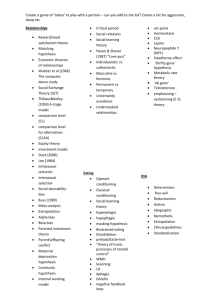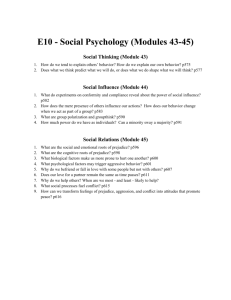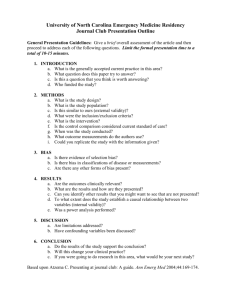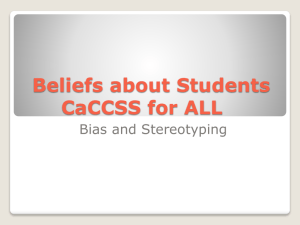How should we measure prejudice against female leaders?
advertisement
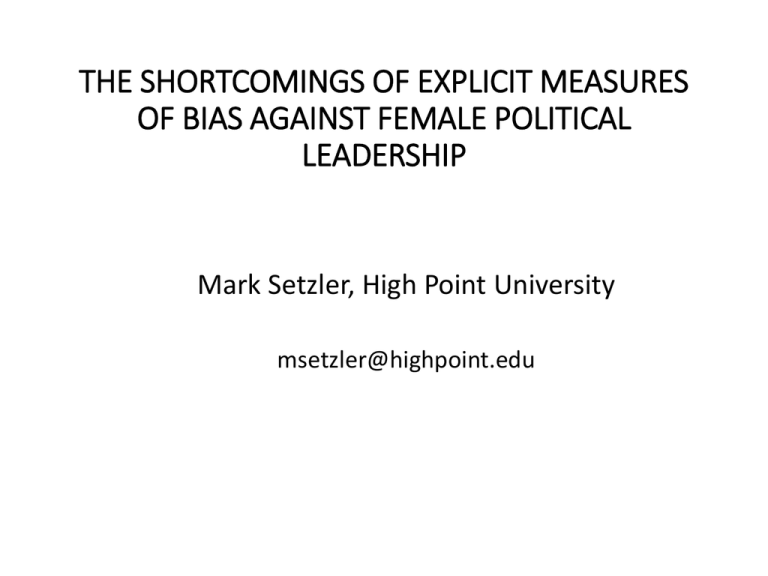
THE SHORTCOMINGS OF EXPLICIT MEASURES OF BIAS AGAINST FEMALE POLITICAL LEADERSHIP Mark Setzler, High Point University msetzler@highpoint.edu How explicitly are we measuring gender bias? • “… Generally speaking, would a male or a female better handle that issue better?” • “If two equally qualified candidates were running for office, one a man and the other a woman, do you think you would be more likely to vote for the man or the woman?” • WVS: “How much do you agree with the following statement: generally-speaking, males make better political leaders than women do.” • How widely used is the WVS measure? Why might explicit measurements be a problem? • Studies on racial and ethnic prejudice find that many respondents shy away from giving socially undesirable responses, especially if no “face saving” framing statement is included. • Individuals with more power understate their prejudices against minorities with less power, especially when the interviewer is a minority (example: polling and voting in mixed-race elections) • Group solidarity can lead members to under-report bias and behaviors (example: Evangelicals self-reported church attendance vs. self-reported anti-LGBT bias) • Some people may overstate their biases if they belong to social groups that are publicly intolerant (example, studies of nativism) Hypotheses • Hypothesis 1: A highly explicit survey question measuring prejudice against female political leadership will report less bias than a virtually similar question structured to reduce social desirability effects. • Hypothesis 2: Males will be more likely to express prejudice on the masked indicator than the explicit one. • Hypothesis 3: Non-whites and Democrats will disproportionately express prejudice exclusively on the masked indicator. • Hypothesis 4: Evangelicals and Republicans will disproportionately express prejudice exclusively on the more explicit measure Data and Measurement • 2008 survey by the Pew Research Foundation that sampled 2,250 individuals. • The explicit measure: “Which one of the following statements comes closest to your opinion about men and women political leaders?” “Men (Women) generally make better political leaders than women (men)” and “In general, women and men make equally good political leaders.” Coded: Men = 1; Women/Equal = 0 Data and Measurement • The masked measure: As you may know, our country has 8 women governors out of 50, and 16 women senators out of 100. There may be many reasons that there are fewer women than men in high political offices. Here is a list of some of them. For each, please tell me whether you think it is a major reason, a minor reason, or not a reason why there are fewer women in politics. A battery of 7 statements randomly was presented, including: Generally speaking, women don’t make as good leaders as men Coded: Major or minor reason= 1; Not a reason = 0 • IVs: Male, Dem/Republican, Non-white • Controls: Educational attainment (1-4), Interviewer’s Gender (Female), Age (Years), & Relig. Attend (1-5) The proportion of persons accepting the premise that males are better leader: Explicit versus masked measurement Sample results: Predicted probabilities of accepting the premise that males are better leaders (Logistic R) Differential effects in the probability of expressing gender bias on only one measure type (Logistic R) Conclusions • Measured more discreetly, prejudice against female is much more common than is typically reported (43% of Americans vs. 20%) • We may in inaccurately assuming that some groups (evangelicals and Republicans) are disproportionately more biased against women leaders and that others (Democrats and non-whites) are more friendly than is actually the case. • There’s little evidence that Americans of any type are overstating their bias despite that some important political forces continue to praise traditional gender roles and institutions that model them • Some key questions for future research: • Will these findings travel outside of the US? • Are social desirability effects a problem for survey research focusing on behaviors towards women politicians, too?

